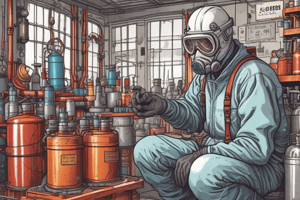Podcast
Questions and Answers
What is the primary purpose of fire safety procedures?
What is the primary purpose of fire safety procedures?
- To contain biological hazards
- To reduce the amount of damage and injuries caused by fires (correct)
- To identify and isolate hazardous waste
- To reduce the damage caused by radiation exposure
Which of the following is a type of thermal method for treating hazardous waste?
Which of the following is a type of thermal method for treating hazardous waste?
- Ion exchange
- Neutralization
- Precipitation
- High-temperature incineration (correct)
What is the purpose of wearing lead aprons or vests in radiation protection?
What is the purpose of wearing lead aprons or vests in radiation protection?
- To identify and isolate hazardous waste
- To contain biological hazards
- To reduce the risk of fire hazards
- To reduce a worker's radiation dose (correct)
What type of growth media is used to generate stocks of bacteria?
What type of growth media is used to generate stocks of bacteria?
What is the shape of the bacterial species Staphylococcus aureus?
What is the shape of the bacterial species Staphylococcus aureus?
What is the primary purpose of risk assessments in fire safety?
What is the primary purpose of risk assessments in fire safety?
What is the purpose of solid growth media in microbiology?
What is the purpose of solid growth media in microbiology?
What is the primary purpose of chemical methods in treating hazardous waste?
What is the primary purpose of chemical methods in treating hazardous waste?
What is the primary purpose of a biosafety cabinet?
What is the primary purpose of a biosafety cabinet?
What is the main difference between Type A1 and Type B2 biosafety cabinets?
What is the main difference between Type A1 and Type B2 biosafety cabinets?
What is the primary goal of aseptic technique in microbiology laboratories?
What is the primary goal of aseptic technique in microbiology laboratories?
What is the purpose of wearing personal protective equipment (PPE) in a microbiology laboratory?
What is the purpose of wearing personal protective equipment (PPE) in a microbiology laboratory?
What is the correct way to handle samples and cultures in a microbiology laboratory?
What is the correct way to handle samples and cultures in a microbiology laboratory?
What is the purpose of using an inoculating loop in a microbiology laboratory?
What is the purpose of using an inoculating loop in a microbiology laboratory?
What is the primary principle of aseptic technique in microbiology laboratories?
What is the primary principle of aseptic technique in microbiology laboratories?
How many levels of biosafety are there?
How many levels of biosafety are there?
What is the primary purpose of a biosafety cabinet?
What is the primary purpose of a biosafety cabinet?
What should be done before and after a lab session to prevent contamination of cultures and other materials?
What should be done before and after a lab session to prevent contamination of cultures and other materials?
What is the main difference between a laminar flow hood and a biosafety cabinet?
What is the main difference between a laminar flow hood and a biosafety cabinet?
What should be done in case of a spill in the lab?
What should be done in case of a spill in the lab?
What is the purpose of a laminar flow hood?
What is the purpose of a laminar flow hood?
Why is it important to read all assigned materials before a lab session?
Why is it important to read all assigned materials before a lab session?
What should be avoided in the lab to prevent contamination of cultures and other materials?
What should be avoided in the lab to prevent contamination of cultures and other materials?
What should be done with contaminated materials in the lab?
What should be done with contaminated materials in the lab?
Flashcards are hidden until you start studying
Study Notes
Radiation Protection
- Lead aprons or vests can reduce a worker's radiation dose from X-rays and gamma rays.
Fire Safety
- Fire safety procedures aim to reduce damage and injuries caused by fires.
- Risk assessments help identify and reduce areas of fire risk.
- An emergency and evacuation plan is formulated in case of a fire.
Hazardous Waste Treatment
- Chemical methods for treating hazardous waste include:
- Ion exchange
- Precipitation
- Oxidation
- Reduction
- Neutralization
- Thermal methods include high-temperature incineration, which can detoxify and destroy certain organic wastes.
Microbiology
Shape/Morphology
- Bacterial species names can be classified according to their shape.
- Example: Staphylococcus aureus, Gram positive, cocci.
Growth Media
- Solid growth media is used in the following forms:
- Agar plates
- Agar slants
- Agar deeps
- Agar plates are made by pouring melted agar into a petri dish.
- Agar slants and agar deeps are made by pouring melted agar into a test tube and allowing it to solidify.
Biosafety Cabinet
- A biosafety cabinet is a primary engineering control used to protect personnel against biohazardous or infectious agents.
- It filters both the inflow and exhaust air.
- There are 3 classes of biosafety cabinets: Type A1, Type A2, Type B1, and Type B2.
- There are 4 levels of biosafety: BSL 1, BSL 2, BSL 3, and BSL 4.
Aseptic Technique
- Aseptic technique is a method that involves target-specific practices and procedures to reduce contamination from microbes.
- It is a compulsory laboratory skill in microbiology.
- Routine practices used in microbiology laboratories to prevent contamination include:
- Wearing appropriate personal protective equipment (PPE)
- Using a biological safety cabinet
- Cleaning and sterilizing surfaces and equipment
- Handling samples and cultures carefully
- Inoculating loop can be used to perform aseptic manipulations without the risk of contamination.
- Samples and cultures should be handled using sterile pipettes and equipment to minimize the risk of contamination.
Laboratory Safety
- Clean the lab bench with disinfectant before and after lab.
- Keep the lab bench free of unnecessary materials.
- Do not take cultures from the lab area.
- Dispose all contaminated materials in autoclave bags.
- Immediately report all accidents and spills to the instructor.
- Cover spills with disinfectant-soaked paper towels for at least 15 minutes before disposing them.
Laminar Flow vs. Biosafety Cabinet
- A laminar flow hood is not a biological safety cabinet.
- It is designed to provide a sterile environment to protect the product, but does not provide protection to the worker.
- A biological safety cabinet is a primary containment device used with biological material, protecting the user from hazardous material using directional air flow.
Studying That Suits You
Use AI to generate personalized quizzes and flashcards to suit your learning preferences.




